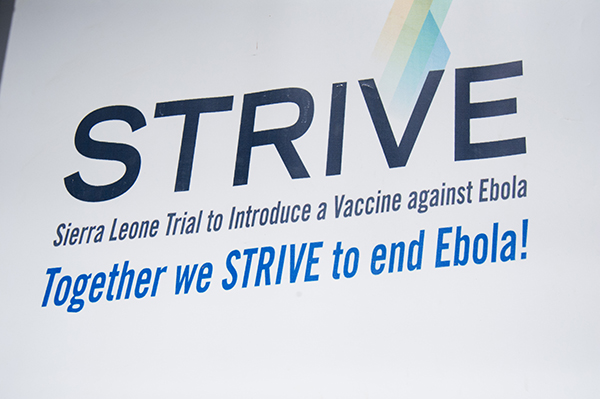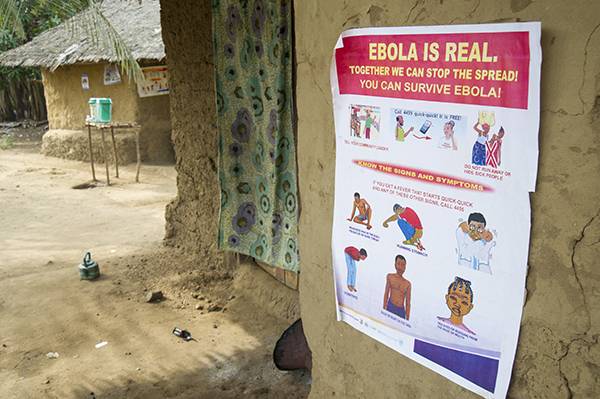You are here
We Must All Work Together to Fight Ebola in DRC
Health workers in the Democratic Republic of Congo (DRC) are racing to stop the latest flare up of Ebola, even as it has evolved and reached Mbandaka, a port city of nearly 1.2 million people.
While the World Health Organization (WHO) hasn’t yet declared the outbreak a Public Health Emergency of International Concern, its Emergency Committee has warned that there is a risk Ebola could spread rapidly, including to other countries, now that the virus has moved beyond isolated areas to a densely populated city. The committee also noted that international agencies are responding swiftly and comprehensively.
Facing another outbreak of Ebola, I’m reminded of the upcoming fifth anniversary of the West Africa Ebola epidemic, in which the CDC Foundation was heavily involved. Once Ebola gained a foothold and spiraled out of control it had dire consequences, infecting 28,600 people and killing 11,300. Beyond the sheer numbers, vibrant lives were cut short, families were torn apart, livelihoods were lost and the economies of Guinea, Liberia and Sierra Leone were dealt very serious blows.
Importantly, we learned many valuable lessons about how to prevent, detect and respond to disease outbreaks as well as how all sectors must come together to protect and save lives when time is of the utmost importance. In the 2014–16 response, CDC’s work with partners in so many ways provided a vital boost to stem the epidemic.
The CDC Foundation—with generous and rapid financial support from philanthropies, corporations and individuals—provided essential resources to bolster CDC’s work and put immediate resources on the ground. Ultimately, concerted investments and interventions from government entities, accelerated by the philanthropic and private sectors, helped turn back the epidemic while strengthening public health systems against future outbreaks.
 While the CDC Foundation supported a wide variety of response activities, one important aspect of the Foundation’s support included providing initial funding to the Sierra Leone Trial to Introduce a Vaccine Against Ebola (STRIVE) before government funds were available. Because the Foundation had received generous flexible funding through donor contributions, the Foundation was able to very quickly approve the provision of up to $2.5 million to support this critical work, with more than $1 million of these funds actually being called upon to kick-start the trial.
While the CDC Foundation supported a wide variety of response activities, one important aspect of the Foundation’s support included providing initial funding to the Sierra Leone Trial to Introduce a Vaccine Against Ebola (STRIVE) before government funds were available. Because the Foundation had received generous flexible funding through donor contributions, the Foundation was able to very quickly approve the provision of up to $2.5 million to support this critical work, with more than $1 million of these funds actually being called upon to kick-start the trial.
Thanks to our donors, activities ranging from the purchase of cold-chain storage equipment for vaccines to the construction of a facility for the trial were made possible. In recent days, a full issue of the Journal of Infectious Diseases focusing on STRIVE was released ahead of schedule to provide crucial insights for those working on Ebola vaccinations in DRC, who are utilizing the same vaccine as STRIVE.
How can we work together to help today?
Based on the current situation in DRC and its previous Ebola responses, CDC anticipates a number of potential areas of need, and the list will grow and evolve if CDC activates its Emergency Operations Center. Right now, CDC envisions funding needs to deploy DRC teams with specialized epidemiology skills. In addition, CDC anticipates needing funding for a regional emergency operations center, provision of personal protective equipment, implementation of infection control practices, safe burial training and community outreach.
The DRC Ebola outbreak reminds us that we all are connected. Fighting infectious diseases at the source is crucial to protect and save lives at home and abroad. I urge you to join us in the fight by providing support to allow us to respond flexibly to meet needs on the ground. You are vital to CDC’s work on Ebola and responses to other health emergencies. Give today to the CDC Foundation’s Emergency Response Fund to save lives and protect the health, safety and security of America and the world.

